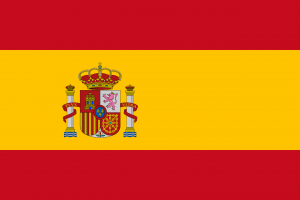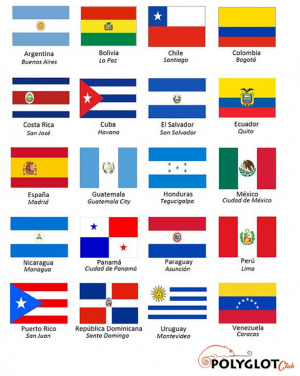Difference between revisions of "Language/Spanish/Vocabulary/How-to-Say-Hello-and-Greetings"
< Language | Spanish | Vocabulary
Jump to navigation
Jump to search
m (Quick edit) |
|||
| (13 intermediate revisions by 3 users not shown) | |||
| Line 2: | Line 2: | ||
[[File:greetings-say-hello-polyglot-club.png|thumb]] | [[File:greetings-say-hello-polyglot-club.png|thumb]] | ||
[[File:Spanish-Language-PolyglotClub.png|thumb]] | [[File:Spanish-Language-PolyglotClub.png|thumb]] | ||
[[File:flag-Spanish-Countries- | [[File:flag-Spanish-Countries-PolyglotClub2.jpg|thumb]] | ||
¿Qué tal, amigos? 😃 | ¿Qué tal, amigos? 😃 | ||
➡ In today's lesson you will learn how to greet in Spanish. | ➡ In today's lesson you will learn how to greet in Spanish. | ||
Do you want to learn how to greet in Spanish, weither you are visiting any of the following Spanish speaking country: | Do you want to learn how to greet in Spanish, weither you are visiting any of the following Spanish speaking country: | ||
| Line 30: | Line 28: | ||
* Uruguay | * Uruguay | ||
* Venezuela | * Venezuela | ||
Greetings are an important part of any language because they allow you to connect and communicate with others. | Greetings are an important part of any language because they allow you to connect and communicate with others. | ||
If you’re planning a trip to the country or are trying to learn Spanish, keep reading to discover some of the most important greetings. | If you’re planning a trip to the country or are trying to learn Spanish, keep reading to discover some of the most important greetings. | ||
Let’s get started! 🤗 | Let’s get started! 🤗 | ||
<span link>Take a moment to explore these relevant pages as you conclude this lesson:</span> [[Language/Spanish/Vocabulary/Bird|Bird]], [[Language/Spanish/Vocabulary/Parts-of-a-fruit|Parts of a fruit]], [[Language/Spanish/Vocabulary/Refranes-de-Venezuela|Refranes de Venezuela]] & [[Language/Spanish/Vocabulary/Greetings|Greetings]]. | |||
__TOC__ | __TOC__ | ||
==Greetings== | ==Greetings== | ||
| Line 48: | Line 45: | ||
|morning greeting | |morning greeting | ||
|Buenos días | |Buenos días / Buen día | ||
|all | |all | ||
|- | |- | ||
|afternoon and evening greeting | |afternoon and evening greeting | ||
|Buenas tardes | |Buenas tardes / Buena tarde | ||
|all | |all | ||
|- | |- | ||
|nighttime greeting | |nighttime greeting | ||
|Buenas noches | |Buenas noches / Buena noche | ||
|all | |all | ||
|- | |- | ||
| Line 111: | Line 108: | ||
|all | |all | ||
|- | |- | ||
|how are you? informal | |how are you? informal | ||
|¿Qué tal? | |¿Qué tal? | ||
| | |Mostly used in Spain | ||
|- | |||
|how are you? spoken to one person, formal | |||
|¿Qué tal está? | |||
|Mostly used in Spain | |||
|- | |||
|how are you? spoken to one person, informal | |||
|¿Qué tal estás? | |||
|Mostly used in Spain | |||
|- | |||
|how are you? spoken to a group of people | |||
|¿Qué tal están? | |||
|Mostly used in Spain | |||
|- | |- | ||
| Line 142: | Line 150: | ||
|- | |- | ||
|how are you? informal, | |how are you? informal, ”what’s happening” | ||
| ¿Qué pasa? | |||
|Spain [spa-cas] | |||
|- | |- | ||
|how are you? informal, "what happened" | |how are you? informal, "what happened" | ||
| ¿Qué pasó? | |||
|Mexico and Cuba [spa-ame] | |||
|- | |- | ||
|morning greeting | |morning greeting | ||
|Buen día | |Buen día | ||
| | |Argentina and Costa Rica [spa-ame] | ||
|- | |- | ||
|informal greeting | |informal greeting | ||
|Buenas | |Buenas | ||
| | |Spain [spa-cas] | ||
|- | |- | ||
|how are you? informal | |how are you? informal | ||
|¿Qué onda? | |¿Qué onda? | ||
| | |Mexico [spa-ame] | ||
|- | |- | ||
|how are you? informal | |how are you? informal | ||
|¿Qué hubo? | |¿Qué hubo? | ||
| | |Mexico [spa-ame] | ||
|- | |- | ||
|how are you? informal | |how are you? informal | ||
|¿Qué húbole? | |¿Qué húbole? | ||
| | |Mexico [spa-ame] | ||
|- | |- | ||
|how are you? very informal | |how are you? very informal | ||
|Quiubo | |Quiubo | ||
| | |Mexico, Central and South America [spa-ame] | ||
|- | |- | ||
|how are you? very informal | |how are you? very informal | ||
|Quiúbolas | |Quiúbolas | ||
| | |Mexico [spa-ame] | ||
|- | |- | ||
|how are you? very informal | |how are you? very informal | ||
|Quiay | |Quiay | ||
| | |Colombia [spa-ame] | ||
|- | |- | ||
|how are you? very informal | |how are you? very informal | ||
|Epa | |Epa | ||
| | |Venezuela [spa-ame] | ||
|- | |- | ||
|how are you? very informal | |how are you? very informal | ||
|Épale | |Épale | ||
| | |Venezuela [spa-ame] | ||
|- | |- | ||
|how are you? very informal | |how are you? very informal | ||
|Diay | |Diay | ||
| | |Costa Rica [spa-ame] | ||
|- | |- | ||
|how are you? very informal | |how are you? very informal | ||
|Idiay | |Idiay | ||
| | |Costa Rica [spa-ame] | ||
|- | |- | ||
|greeting | |greeting | ||
|Buenos días le dé Dios | |Buenos días le dé Dios | ||
| | |southwest United States [spa-ame] | ||
|- | |- | ||
|greeting | |greeting | ||
|Buenos días te dé Dios | |Buenos días te dé Dios | ||
| | |southwest United States [spa-ame] | ||
|- | |- | ||
| Line 248: | Line 256: | ||
|Bienvenidas | |Bienvenidas | ||
|all | |all | ||
|- | |- | ||
| | |how are you? informal, "what's new" | ||
|¿Qué onda? | |¿Qué onda? | ||
|This one is popular in Central America and sometimes concluded with güey or güero (“dude”). | |This one is popular in Central America and sometimes concluded with güey or güero (“dude”). | ||
|- | |- | ||
| | |how are you? informal, "what's new" | ||
|¿Qué más? | |¿Qué más? | ||
| | | | ||
|- | |- | ||
| | |how are you? informal, "what's new" | ||
|¿Qué hay? | |¿Qué hay? | ||
| | |Mostly used in Spain | ||
|- | |- | ||
| | |how are you? informal, "what's new" | ||
|¿Qué hubo? | |¿Qué hubo? | ||
| | | | ||
|- | |- | ||
| | |how are you? informal, "what's new" | ||
|¿Qué es lo que hay? | |¿Qué es lo que hay? | ||
|Dominican Republic | |Dominican Republic | ||
|- | |- | ||
| | |how are you? informal, "what's new" | ||
|¿Qué es lo que? | |¿Qué es lo que? | ||
|Dominican Republic | |Dominican Republic | ||
|- | |- | ||
| | |how are you? informal, "what's new" | ||
| | |¿Qué lo que? | ||
|Dominican Republic | |Dominican Republic | ||
|- | |- | ||
|Informal greeting | |Informal greeting | ||
|¿Qué | |¿Qué cuentas? | ||
| | | | ||
|- | |- | ||
| Line 307: | Line 299: | ||
|- | |- | ||
|Informal greeting | |Informal greeting | ||
|¿Qué | |¿Qué haces? | ||
| | | | ||
|- | |||
|how are you? informal, ”what’s new” | |||
|¿Qué cuentas? | |||
|Mostly used in Spain | |||
|- | |||
|how are you? informal, ”what news do you bring” | |||
|¿Qué me cuentas? | |||
|Mostly used in Spain | |||
|- | |||
|how are you? informal, ”how’s it going?” | |||
|¿Cómo te va? | |||
|Mostly used in Spain | |||
|- | |||
|greeting spoken to a person after a long or unexpected absence, ”what a miracle!” | |||
|¡Vaya sorpresa! / ¡Menuda sorpresa! | |||
|all | |||
|} | |} | ||
| Line 349: | Line 358: | ||
[[Category:Jennifers]] | [[Category:Jennifers]] | ||
==Videos== | |||
===Learn Spanish - How to Greet People in Spanish - YouTube=== | |||
<youtube>https://www.youtube.com/watch?v=SoPiuMh6lnQ</youtube> | |||
===How to Greet Someone in Spanish - YouTube=== | |||
<youtube>https://www.youtube.com/watch?v=YUmNVMgNR4M</youtube> | |||
==Other Lessons== | |||
* [[Language/Spanish/Vocabulary/Panamanian-Slang|Panamanian Slang]] | |||
* [[Language/Spanish/Vocabulary/Health|Health]] | |||
* [[Language/Spanish/Vocabulary/Words-French-Origin|Words French Origin]] | |||
* [[Language/Spanish/Vocabulary/Feelings-and-Emotions|Feelings and Emotions]] | |||
* [[Language/Spanish/Vocabulary/Business|Business]] | |||
* [[Language/Spanish/Vocabulary/Costarican-Slang|Costarican Slang]] | |||
* [[Language/Spanish/Vocabulary/Confusing-Expressions|Confusing Expressions]] | |||
* [[Language/Spanish/Vocabulary/Family|Family]] | |||
* [[Language/Spanish/Vocabulary/longest-word|longest word]] | |||
* [[Language/Spanish/Vocabulary/Fungus-|Fungus ]] | |||
<span links></span> | |||
Latest revision as of 12:31, 27 March 2023
How to greet in Spanish Language (any Spanish speaking country)
¿Qué tal, amigos? 😃
➡ In today's lesson you will learn how to greet in Spanish.
Do you want to learn how to greet in Spanish, weither you are visiting any of the following Spanish speaking country:
- Argentina
- Bolivia
- Chile
- Colombia
- Costa Rica
- Cuba
- Dominican Republic
- Ecuador
- El Salvador
- Equatorial Guinea
- Guatemala
- Honduras
- Mexico
- Nicaragua
- Panama
- Paraguay
- Peru
- Spain
- Uruguay
- Venezuela
Greetings are an important part of any language because they allow you to connect and communicate with others.
If you’re planning a trip to the country or are trying to learn Spanish, keep reading to discover some of the most important greetings.
Let’s get started! 🤗
Take a moment to explore these relevant pages as you conclude this lesson: Bird, Parts of a fruit, Refranes de Venezuela & Greetings.
Greetings[edit | edit source]
| English | Spanish | Spanish speaking countries |
|---|---|---|
| morning greeting | Buenos días / Buen día | all |
| afternoon and evening greeting | Buenas tardes / Buena tarde | all |
| nighttime greeting | Buenas noches / Buena noche | all |
| informal greeting | Hola | all |
| how are you? spoken to one person, formal | ¿Cómo está? | all |
| how are you? spoken to one person, formal | ¿Cómo está usted? | all |
| how are you? spoken to one person, informal | ¿Cómo estás? | all |
| how are you? spoken to a group of people | ¿Cómo están? | all |
| how are you? spoken to a group of people | ¿Cómo están ustedes? | all |
| rely to Cómo está, Cómo está usted, Cómo estás, and Cómo están | Bien | all |
| rely to Cómo está, Cómo está usted, Cómo estás, and Cómo están | Muy bien | all |
| rely to Cómo está, Cómo está usted, Cómo estás, and Cómo están | Bien, gracias | all |
| rely to Cómo está, Cómo está usted, and Cómo estás | Estoy bien | all |
| how are you? informal | ¿Qué tal? | Mostly used in Spain |
| how are you? spoken to one person, formal | ¿Qué tal está? | Mostly used in Spain |
| how are you? spoken to one person, informal | ¿Qué tal estás? | Mostly used in Spain |
| how are you? spoken to a group of people | ¿Qué tal están? | Mostly used in Spain |
| how are you? informal | ¿Qué tal andas? | all |
| how are you? informal, "what's new" | ¿Qué hay de nuevo? | all |
| how are you? informal, "what's new" | ¿Qué hay? | all |
| how are you? informal, "what news do you bring" | ¿Qué novedades traes? | all |
| how are you? informal, "how's it going?" | ¿Cómo lo llevas? | all |
| how are you? informal, ”what’s happening” | ¿Qué pasa? | Spain [spa-cas] |
| how are you? informal, "what happened" | ¿Qué pasó? | Mexico and Cuba [spa-ame] |
| morning greeting | Buen día | Argentina and Costa Rica [spa-ame] |
| informal greeting | Buenas | Spain [spa-cas] |
| how are you? informal | ¿Qué onda? | Mexico [spa-ame] |
| how are you? informal | ¿Qué hubo? | Mexico [spa-ame] |
| how are you? informal | ¿Qué húbole? | Mexico [spa-ame] |
| how are you? very informal | Quiubo | Mexico, Central and South America [spa-ame] |
| how are you? very informal | Quiúbolas | Mexico [spa-ame] |
| how are you? very informal | Quiay | Colombia [spa-ame] |
| how are you? very informal | Epa | Venezuela [spa-ame] |
| how are you? very informal | Épale | Venezuela [spa-ame] |
| how are you? very informal | Diay | Costa Rica [spa-ame] |
| how are you? very informal | Idiay | Costa Rica [spa-ame] |
| greeting | Buenos días le dé Dios | southwest United States [spa-ame] |
| greeting | Buenos días te dé Dios | southwest United States [spa-ame] |
| greeting spoken to a person after a long or unexpected absence, "what a miracle!" | ¡Qué milagro! | all |
| welcome greeting spoken to a man | Bienvenido | all |
| welcome greeting spoken to a woman | Bienvenida | all |
| welcome greeting spoken to a group of people | Bienvenidos | all |
| welcome greeting spoken to a group of men | Bienvenidos | all |
| welcome greeting spoken to a group of women | Bienvenidas | all |
| how are you? informal, "what's new" | ¿Qué onda? | This one is popular in Central America and sometimes concluded with güey or güero (“dude”). |
| how are you? informal, "what's new" | ¿Qué más? | |
| how are you? informal, "what's new" | ¿Qué hay? | Mostly used in Spain |
| how are you? informal, "what's new" | ¿Qué hubo? | |
| how are you? informal, "what's new" | ¿Qué es lo que hay? | Dominican Republic |
| how are you? informal, "what's new" | ¿Qué es lo que? | Dominican Republic |
| how are you? informal, "what's new" | ¿Qué lo que? | Dominican Republic |
| Informal greeting | ¿Qué cuentas? | |
| Informal greeting | ¿Qué me cuentas? | |
| Informal greeting | ¿Qué nos cuentas? | |
| Informal greeting | ¿Qué haces? | |
| how are you? informal, ”what’s new” | ¿Qué cuentas? | Mostly used in Spain |
| how are you? informal, ”what news do you bring” | ¿Qué me cuentas? | Mostly used in Spain |
| how are you? informal, ”how’s it going?” | ¿Cómo te va? | Mostly used in Spain |
| greeting spoken to a person after a long or unexpected absence, ”what a miracle!” | ¡Vaya sorpresa! / ¡Menuda sorpresa! | all |
Sources[edit | edit source]
Free Spanish Lessons[edit | edit source]
Language Exchange[edit | edit source]
Forum[edit | edit source]
Tools[edit | edit source]
Marketplace[edit | edit source]
Videos[edit | edit source]
Learn Spanish - How to Greet People in Spanish - YouTube[edit | edit source]
How to Greet Someone in Spanish - YouTube[edit | edit source]
Other Lessons[edit | edit source]
- Panamanian Slang
- Health
- Words French Origin
- Feelings and Emotions
- Business
- Costarican Slang
- Confusing Expressions
- Family
- longest word
- Fungus


